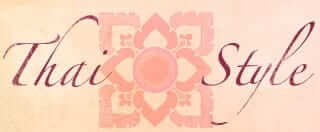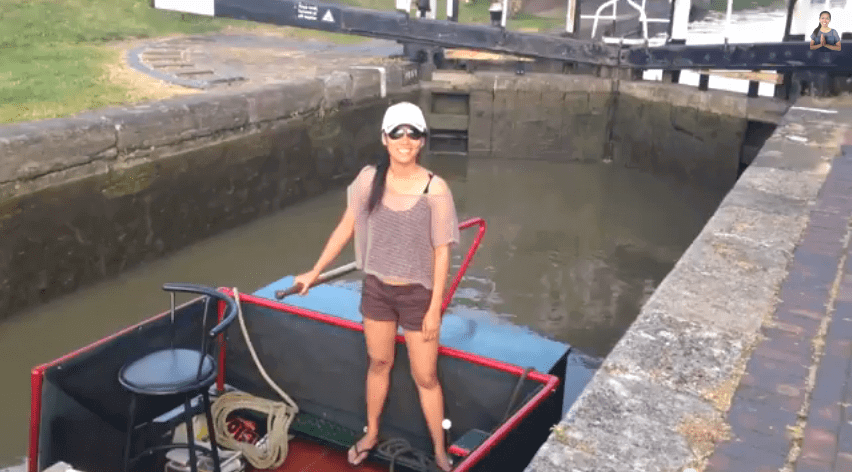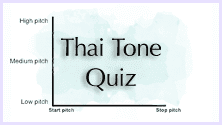Canal boating
After an adventurous day at Wildwood in Guilford, I went on a canal boat for a few days in Milton Keynes.
Watch the video of me on the boat and answer the question I ask in the comments below!
หลังจากวันผจญภัยปีนป่ายที่ไวลด์วูดที่เมืองกิลด์ฟอร์ด ฉันได้ไปนั่งเรือเป็นเวลาสองสามวันที่เมืองมิลทันคีนส์
ดูวีดีโอตอนฉันอยู่บนเรือ และตอบคำถามโดยเขียนที่คอมเม็นท์ด้านล่าง
With: ครูเจี๊ยบ : Kruu Jiab
Question:
Have you ever been on a boat like this? In Thailand we have long tail boats which are used to travel along rivers, canals and the sea. I rarely see a flat bottom boat in Thailand like the English canal boat.
คุณเคยนั่งเรือแบบนี้ไหม ที่ประเทศไทย เรามีเรือหางยาวใช้ในการเดินทางตามแม่น้ำ ลำคลอง และริมทะเล ฉันไม่ค่อยเห็นเรือท้องแบนแบบอังกฤษนี้ในคลองที่เมืองไทยเลย
Sentence structure : Subject + tense word + Explanation 1 (verb) + Explanation 2 (noun) + Explanation 3 (modifier) + Explanation 3 (modifier) + Question + Particle
Thai script : คุณ เคย นั่ง เรือ แบบ นี้ ไหม คะ
Transliteration : Koon Keoi Nûng Ruea Bàeb Née Măi? Ká
Translation word by word : You ever to sit boat like/type/sort this ? polite particle
English translation : Have you ever been on a boat like this?
Note 1: เคย : Keoi = [tense word] ever, have ever (used in front of a verb), ไม่เคย : Mâi Keoi = [tense word] not ever, never, have never (used in front of a verb)
Note 2: นั่ง : Nûng = [verb] to sit
In transport, the word นั่ง : Nûng is used as a verb meaning to travel by.
In Thai language, we use the action word to describe what we do. In my opinion, when Thais communicate, it is like drawing a picture. We have a subject then we draw descriptive images about the subject.
Note 3: The yes/no question ไหม : Măi? is used after a statement to change a statement into a question when you want to know a ‘positive’ or ‘negative’ answer. ไหม : Măi? is equivalent to ‘Do…?, Would…?, Are…?, Is…?, Am…?’ in English. (Learn more in my Speak Thai Course Chapters 1 and 14)
Answer:
To answer the question word ไหม : Măi?, you must start with the main word that the speaker would like to know.
Positive answer:
Long: ผม/ฉัน เคย นั่ง เรือ แบบ นี้ ครับ/ค่ะ : Pŏ’m/Chŭn Keoi Nûng Ruea Bàeb Née Krúb/Kâ = I have been on a boat like this.
Short: เคย ครับ/ค่ะ : Keoi Krúb/Kâ = (I) have been.
Negative answer:
Long: ผม/ฉัน ไม่ เคย นั่ง เรือ แบบ นี้ ครับ/ค่ะ : Pŏ’m/Chŭn Mâi Keoi Nûng Ruea Bàeb Née Krúb/Kâ = I have never been on a boat like this.
Short: ไม่ เคย ครับ/ค่ะ : Mâi Keoi Krúb/Kâ = (I) have never. / Never.
Note 2: At the end of the video, I say;
ฉันขับเรือเป็นค่ะ : Chŭn Kùb Ruea Bpe’n = I + to drive + boat + capable/know how to = I can drive a boat. / I know how to drive a boat.
Reading Exercise:
(Suitable for upper-intermediate to advance learners)
ในยุคปฏิวัติอุตสาหกรรม คลองในประเทศอังกฤษเป็นระบบคมนาคมทางน้ำหลักในการขนส่งผลิตภัณฑ์อุตสาหกรรม ม้าได้ถูกใช้ในการลากเรือท้องแบนไปตามคลอง ในปัจจุบันการขนส่งทางบกได้ทดแทนการขนส่งทางน้ำ ดังนั้นเรือท้องแบนในคลองได้กลายเป็นกิจกรรมพักผ่อนหย่อนใจ ขอบคุณเพื่อนของฉัน เจมส์และเอมี่ ที่ชวนทอมสามีของฉันและฉัน ไปเที่ยวกับพวกเขา พวกเขาสอนเราขับเรือและสอนเรื่องต่างๆ เกี่ยวกับเรือและระบบคลองของประเทศอังกฤษ
ประตูน้ำเป็นวิศวกรรมที่ชาญฉลาด ถูกสร้างขึ้นมาเพื่อควบคุมระดับน้ำให้น้ำขึ้นหรือลงเพื่อเคลื่อนเรือขึ้นตามลำดับพื้นที่เนินสูงต่ำของประเทศอังกฤษ การเที่ยวล่องเรือคลองนั้นไม่ใช่แค่ว่านั่งเล่นพักผ่อนหย่อนใจในเรือ เราต้องคอยเปิดและปิดประตูน้ำเหล่านี้ให้เรือผ่านไปได้ และมันเหนื่อยเอาการอยู่ถ้าเราเจอประตูน้ำหลายๆ ประตู โดยเฉพาะอย่างยิ่งเมื่อเราเจอประตูน้ำที่อยู่ติดๆ กันมากกว่าสามประตู ถึงแม้ว่ามันจะเหนื่อย แต่เราก็สนุกสนาน เราได้ทำอาหารกินกันเยอะมาก รวมทั้งทำบาบีคิวและดื่มพิมส์ (Pim’s) เราได้มองดูโลกรอบๆ ตัวเราผ่านไปอย่างช้าๆ ในโลกสมัยใหม่ที่วุ่นวายนี้ มันเป็นความรู้สึกดีที่ได้ทำอะไรช้าลง
During the industrial revolution, the British canal system of water transport was the main transport for mass industrial products. Horses were used to pull the boat along the canal. Nowadays, road transport replaces water transport so the canal boats become recreation. Thanks to my friends, James and Amy who kindly invited Tom, my husband and I to have a holiday with them. They taught us to drive the boat and many things about canal boat and the British canal system.
A holiday on a canal boat is not about just sitting down on a boat. A lock is cleverly engineered to control the level of water, raising and lowering boats between stretches of water of different levels. We had to open and close the locks and it can be quite tiring if there are a lot of them, especially when we come across flights! Though tiring, we had a great time on the boat, having a lot of food, BBQ, Pim’s and watching the world go by with a very slow pace of life. It’s good to slow down in this modern and hectic world!
Question:
1. เจี๊ยบไปเที่ยวที่ไหน
A. ลอนดอน
B. กิลด์ฟอร์ด
C. มิลทันคีนส์
D. ไบรทัน
2. เจี๊ยบเที่ยวประเภทใดในครั้งนี้
A. ผจญภัยปีนป่าย
B. ดูหนัง
C. นั่งเรือ
D. ขับรถเล่น
3. ในอดีต ประเทศอังกฤษใช้เรือท้องแบนในคลองทำอะไร
A. ขนผู้โดยสาร
B. ขนผลิตภัณฑ์อุตสาหกรรม
C. พักผ่อนหย่อนใจ
D. นั่งเล่น
4. ในอดีต ประเทศอังกฤษใช้พลังใดในการขับเคลื่อนเรือท้องแบนในคลอง?
A. เครื่องยนต์
B. คน
C. ม้า
D. วัว
5. ในประโยค ม้าได้ถูกใช้ในการลากเรือท้องแบนไปตามคลอง ข้อใดถูกต้องที่สุด
A. ถูก is used to indicate the subject is the recipient of the action ใช้.
B. ถูก is used to indicate the subject perform the action ใช้.
C. ถูก is an action word (verb) meaning to feel/touch.
D. ถูก is a modifier (adverb/adjective) meaning cheap.
6. คนไทยใช้เรือท้องแบนหรือเรือหางยาวในการเดินทางในคลอง
A. เรือท้องแบน
B. เรือหางยาว
7. กิจกรรมพักผ่อนหย่อนใจ ภาษาอังกฤษคือข้อใด
A. holiday
B. sport
C. recreation
D. leisure
8. ประตูน้ำ ภาษาอังกฤษคือข้อใด
A. doors
B. window
C. lock
D. flight
9. เรือท้องแบนถูกควบคุมโดยสิ่งใด
A. คนขับ
B. ม้า
C. ลม
D. เครื่องยนต์
10. ในปัจจุบัน เรือท้องแบนถูกขับเคลื่อนโดยสิ่งใด
A. คนขับ
B. ม้า
C. ลม
D. เครื่องยนต์
11. ระบบคมนาคม ภาษาอังกฤษคือข้อใด
A. communication system
B. industrial revolution
C. transport system
D. water transport system
12. มองดูโลกรอบๆ ตัวเราผ่านไป ภาษาอังกฤษคือข้อใด
A. watching myself go by
B. watching the world go by
C. watching the world around us
D. watching the world around us go by
13. ช้าลง ภาษาอังกฤษคือข้อใด
A. be slow
B. be quick
C. to slow down
D. be quicker
14. สมัยใหม่ ภาษาอังกฤษคือข้อใด
A. modern time
B. modern world
C. be modern
D. A. B. and C are all correct
15. วุ่นวาย ภาษาอังกฤษคือข้อใด
A. be hassle
B. be hectic
C. be busy
D. A. B. and C are all correct
16. ยุคปฏิวัติอุตสาหกรรม ภาษาอังกฤษคือข้อใด
A. industrial revolution period
B. transport revolution period
C. fashion revolution period
D. communication revolution period
17. ประโยคใดใกล้เคียงกับประโยคต่อไปนี้ที่สุด เราต้องคอยเปิดและปิดประตูน้ำ
A. เราต้องรอคอยเปิดและปิดประตูน้ำ
B. เราต้องรอเปิดและปิดประตูน้ำ
C. เราต้องคอยโอกาสเปิดและปิดประตูน้ำ
D. เราต้องคอยจังหวะเปิดและปิดประตูน้ำ



